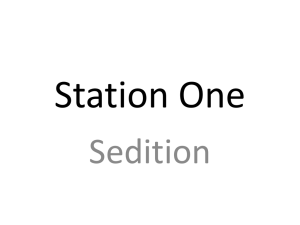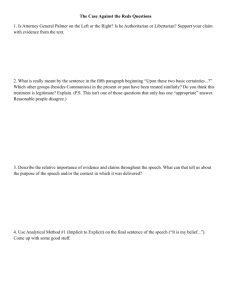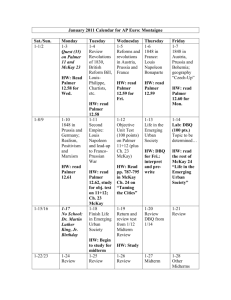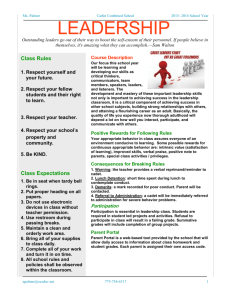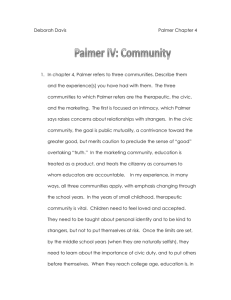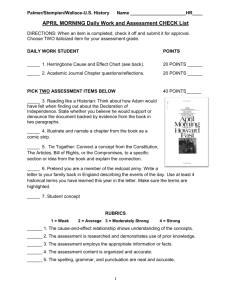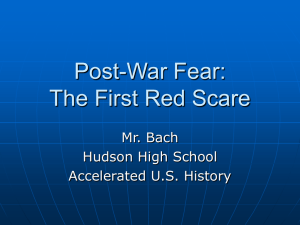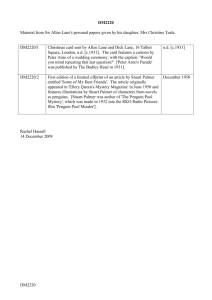EDTL 602 - Morehead State University
advertisement
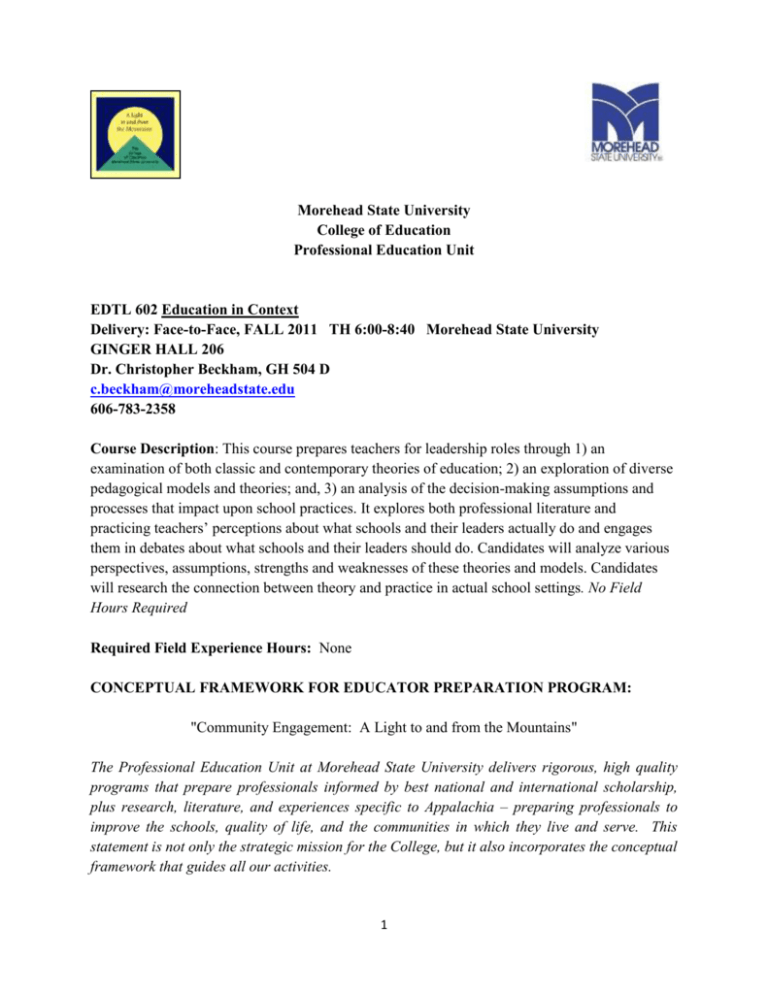
Morehead State University College of Education Professional Education Unit EDTL 602 Education in Context Delivery: Face-to-Face, FALL 2011 TH 6:00-8:40 Morehead State University GINGER HALL 206 Dr. Christopher Beckham, GH 504 D c.beckham@moreheadstate.edu 606-783-2358 Course Description: This course prepares teachers for leadership roles through 1) an examination of both classic and contemporary theories of education; 2) an exploration of diverse pedagogical models and theories; and, 3) an analysis of the decision-making assumptions and processes that impact upon school practices. It explores both professional literature and practicing teachers’ perceptions about what schools and their leaders actually do and engages them in debates about what schools and their leaders should do. Candidates will analyze various perspectives, assumptions, strengths and weaknesses of these theories and models. Candidates will research the connection between theory and practice in actual school settings. No Field Hours Required Required Field Experience Hours: None CONCEPTUAL FRAMEWORK FOR EDUCATOR PREPARATION PROGRAM: "Community Engagement: A Light to and from the Mountains" The Professional Education Unit at Morehead State University delivers rigorous, high quality programs that prepare professionals informed by best national and international scholarship, plus research, literature, and experiences specific to Appalachia – preparing professionals to improve the schools, quality of life, and the communities in which they live and serve. This statement is not only the strategic mission for the College, but it also incorporates the conceptual framework that guides all our activities. 1 Conceptual Framework Outcomes) CFOs: The Unit and the faculty within individual programs assess the degree to which its graduates: 1. Master the content knowledge, professional and the twenty first century skills needed to make an optimal contribution to “whole” student learning in educational settings 2. Are competent in the collection and use of data to inform decision- making and to demonstrate accountability for student learning. 3. Demonstrate professional dispositions. 4. Are culturally competent and understand the regions from which they have come utilizing knowledge and experiences to effectively “bridge the gaps” (economic, achievement, and geographic) ensuring optimal learning for all students. 5. Engage in authentic field experiences in collaboration with committed school based partners and are empowered to improve the quality of education throughout this region and beyond. Student Learning Outcomes (SLOs): At the conclusion of this course candidates will be able to do the following: 1. Understand and analyze key issues facing Kentucky school leaders today in the context of major intellectual, social, economic and political forces shaping education in the state and the nation. (PO 1, PO 13, KTS 7) 2. Understand and analyze core theories and models of education and school leadership in light of contemporary scholarship. (PO 5) 3. Understand the challenges and benefits of differentiated instruction from the perspectives of differing pedagogical paradigms. (PO 3) 4. Understand the importance of cultural diversity as a part of the educational experience as well as the challenges of providing that experience in rural settings. (PO 6) 5. Understand the challenges of putting theory into practice. (PO 8, KTS 2) 6. Be conversant with key concepts from sociology, history, and philosophy of education that will contribute to their professional literacy. (PO 15, KTS 9) 7. Begin to develop local district specific research interests that they can pursue throughout their masters degree studies. (PO 17) 8. Communicate effectively in both oral and written form. All students in this course are required to purchase a Folio 180 account. To purchase Folio180 online or through the MSU Bookstore: 1. Purchase Folio180 at the MSU Bookstore and follow the instructions included with that purchase. 2. To purchase online, go to www.folio180.com/msuky/coe <http://www.folio180.com/msuky/coe> 3. Complete registration and payment information. Your login information will be emailed to you. 4. Note: if you have a Tk20 account, you will NOT need to purchase Folio180--we will provide your Folio180 account information to you via email. Announcements and instructions will also be made on the CoE Facebook page. 5. You will be able to continue using your Folio180 account through any graduate programs you might enroll in through MSU. 6. NOTE: students must have purchased or activated their Folio180 account by midterm or they will receive an "E" at midterm per TEP policy. 2 NCATE/ EPSB Accreditation Alignment of CFOs and SLOs: Program: Aligned with Assessment (point values) Foundations Kentucky Kentucky Education Teacher Reform Standards Act (KYS) (KERA) EDF 680 Education Professional Standards Board (EPSB)*** Council for Social Foundations of Education (CSFE) **** Attendance (10) CFO: 3 SLO: 1 #8 n/a n/a n/a Mission Analysis (25) and Critical Analysis of Decision (25) Philosophy of Education Essay (40) 2.5 AE 1:2 AE 1:11 AE 1:12 AE 5:1 3. Literacy Principles #1-6 2.5 3. Literacy Principles #1-6 Book Discussion (100) 2.5 3. Literacy Principles #1-6 Two Exams (200 total) #2, #3, and #4 AE 1:2 AE 1:11 AE 1:12 AE 5:1 AE 1:2 AE 1:11 AE 1:12 AE 5:1 AE 1: 2 AE 1:11 AE 2:14 AE 2: 16 AE 2: 20 AE 5:1 1. Diversity 2. Assessment 3. Literacy 4. Closing the Achievement Gap Principles #1-6 CFO: 1,2,4 SLO: 1,2 NCATE***** *http://www.kyepsb.net/teacherprep/standards.asp **http://www.education.ky.gov/KDE/Instructional+Resources/Curriculum+Documents+and+Resources/ Academic+Expectations/ ***http://www.kyepsb.net/teacherprep/cart/themes6.asp ****http://www.uic.edu/educ/csfe/standard.htm *****http://www.ncate.org/public/unitStandardsRubrics.asp?ch=4#overview 3 Assignment Descriptions: Assessment (Point Value) Attendance/Participation (10) Professional Literacy (200) Practical Application (25) Personal Reflection/Blackboard Discussion (100: 10 per chapter ) Critical Analysis of a Local School Decision (25) Philosophy of Education Statement (40) Description Attend class, take careful notes on lectures, and participate in class discussions. See details below. Midterm & Final Exams Candidates will identify, describe, and analyze a mission statement of a school or a district. See details below. Candidates will read assignments from Palmer and participate in discussions online through the Blackboard site. See details below. Candidates will examine a decision made by the leadership of a school (preferably one’s own school) and show what assumptions were made in the decision-making process, whom the decision was designed to serve, and the larger impact of the decision on the life of the school. Candidates will synthesize what they have learned in the course from various educational and pedagogical theories and models to articulate their own vision of education and their role in achieving that vision. 1. Attendance/Participation - Attend class, take careful notes on lectures, and participate in class discussions. The amount and quality of a student's participation in discussion may affect his/her grade in the course. 10 possible attendance points count toward the course grade. One absence will be allowed without penalty. Each absence beyond that (for any reason) will result in deducted participation points. Students may make up the absence and get the points back by writing an acceptable essay on a topic approved by the instructor. Essay should be typed, doublespaced and at least 500 words long and is due two class periods from the day the student returns to class. (It is the student’s responsibility to seek out the instructor and get his/her essay topic after being ill.) A student who misses repeatedly and does not write the make-up essays may have negative points in this category, which will be deducted from the total score for other assignments. Students who repeatedly miss part of a class period will be required to write essays as well in order get full credit for participation. 2. Professional Literacy - Midterm and Final exams covering important terms, topics, theories, practices, and people in education. 3. Practical Application/Mission Statement Analysis – Candidates will identify and describe a mission statement of a school or a district. They will analyze that mission statement in light of historical, political, economic and/or philosophical contexts. Questions to be pursued might include the following: Who benefits politically from this mission? What economic impact does this mission have upon local, state, national and global community? What historical trends does this mission statement best reflect? What philosophical theories and/or practices does this 4 mission statement best reflect? To what extent is the formal mission statement actually lived out in the life of the school? This is a formal writing assignment and should reflect the students best writing skills. Please double space. Length: 5 pages 4. Personal Reflection/Blackboard Discussion– Candidates will read assignments from Palmer’s Courage to Teach and Nel Noddings’ The Challenge To Care and participate in discussions online through the Blackboard site. Each week, I will post a question, and students will respond to the question. Each assignment is worth 10 points each. You may do one of two things with this assignment: you may post a response to my question, or you may respond to another student’s response. Either way, the response you compose should be at least 200 words. See the course calendar for the due dates for each of these assignments. 5. Critical Performances: In addition to traditional classroom assessments all participants in this course must successfully complete the following critical performances: A. Critical Analysis of a Local School Decision. Candidates will examine a decision made by the leadership of a school (preferably one’s own school) and show what assumptions were made in the decision-making process, whom the decision was designed to serve, the larger impact of the decision on the life of the school, and how the decision relates to the school's mission. More specifically, students will analyze that decision in light of historical, political, economic and/or philosophical contexts. Questions to be pursued might include the following: Who benefits politically from this decision? What economic impact does this decision have upon local, state, national and global community? What historical trends does this decision best reflect? What philosophical theories and/or practices does this decision best reflect? It is best to select a decision that was controversial or at least one where a person could make a case for making a different choice. This is a formal writing assignment and should reflect the students best writing skills. Length: 5 pages B. Philosophy of Education Statement. Candidates will synthesize what they have learned in the course from various educational and pedagogical theories and models to articulate their own vision of education and their role in achieving that vision. Interactions with course themes and concepts is necessary. Critiques of philosophies and/or endorsement of aspects of philosophies we have studied is expected. Length: 8 pages Both of these critical performances are opportunities for students to apply the things that they've learned from their readings and classroom lectures and discussions, and therefore should make explicit connections to the things they've learned. These are formal writing assignments that should reflect not only the student’s own thinking but his/her very best writing and editing skills as well. Students should write for an audience of professional educators, but should not assume that the audience has taken this class. The student will submit his/her paper as a Word or RTF file attachment on the Discussion Board for classmates to read and discuss. All formal writing should be double spaced and use Times, Times New Roman, or New York font. These two critical performances must be submitted both electronically to the designated Blackboard forum and on paper in class. 5 TEXTBOOKS: (required) Nel Noddings, Challenge to Care in Schools (2005); E.D. Hirsch, The Making of Americans (2009), Palmer, Courage to Teach (2007) GRADING: To determine the course grade each of the following activities will be evaluated and awarded points. Maximum possible points for each activity are indicated below. Grade Scale Attendance/Participation 10 points Midterm Exam 100 points Final Exam 100 points Practical Appl/Mission 25 points Blackboard Discussion 100 points Critical Analysis/Decision 25 points Philosophy of Ed Statement 40 points 90 -100% A 80 - 89% B 70 - 79% C 60 - 69% D 0 - 59% E LATE WORK: Assignments turned in after the class meeting at which it is due but no more than one class meeting late will be penalized one letter grade. Work turned in more than one class meeting after it is due will be penalized by a 50% reduction in points. Work will not be accepted that is more than two class meetings late. ATTENDANCE POLICY: Should a student miss class, it is his/her responsibility to make up for everything missed. Should a student miss class on the day an assignment is due he/she should send the assignment to class with a classmate or call the instructor before class and ask permission to turn it in late. Legitimate absences do not excuse the student from class responsibilities. Examples of reasons that might be excused by the instructor are illness, accident, personal emergency, death in the immediate family, special academic programs, or an authorized university function for which the student's presence is required. If a student has an excused absence on the day of a test, he/she will be allowed to take an alternate make-up exam. See the “ATTENDANCE/PARTICIPATION” section above for details on how absences affect grades. Academic Honesty Cheating, fabrication, plagiarism or helping others to commit these acts will not be tolerated. Academic dishonesty will result in severe disciplinary action including, but not limited to, failure of the student assessment item or course, and/ or dismissal from MSU. If you are not sure what constitutes academic dishonesty, read the Eagle: Student Handbook or ask your instructor. An example of plagiarism is copying information from the internet when appropriate credit is not given. The policy is located at http://moreheadst.edu/units/studentlife/handbook/academicdishonesty.html Americans with Disabilities Act (ADA): In compliance with the ADA, all students with a documented disability are entitled to reasonable accommodations and services to support their academic success and safety. Though a request for services may be made at any time, services are best applied when they are requested at or before the start of the semester. To receive accommodations and services the student should immediately 6 contact the Disability Services Coordinator in room 204-E, ADUC, 606-783-5188, www.moreheadstate.edu/disability/ . Campus Safety Statement: Emergency response information will be discussed in class. Candidates should familiarize themselves with the nearest exit routes in the event evacuation becomes necessary and should notify their instructors at the beginning of the semester if they have special needs or will require assistance during an emergency evacuation. Candidates should familiarize themselves with emergency response protocols at www.moreheadstate.edu/emergency. ***Please SILENCE your cell phones during class. ***Please DO NOT USE COMPUTERS / Laptops during class (unless otherwise instructed by instructor) ---- Absolutely NO Emailing, Texting, instant messaging, net – surfing, etc during class! ***Registration for Blackboard is REQUIRED. 7 EDTL 602 FALL 2013 Tentative Calendar Reading Assignments Class Meeting Date Aug 20 Palmer 1 Aug 27 Palmer 2, Hirsch 1 Sept Sept Sept Palmer 3, Disc 3 on Palmer 3 Palmer 4 Disc 4 on Palmer 4 Palmer 5, Hirsch 2 Disc 5 on Palmer 5 Palmer 6 Disc 6 on Palmer Final Discussion on Palmer 10 Oct 1 Palmer 7 Oct 8 Oct 15 Nov Hirsch 3, 22 Noddings 1-2 Hirsch 4, Noddings 3-4 29 Hirsch 5, 5 Noddings 5-6 Hirsch 6,Noddings 12 7-8 Noddings 919 10 Noddings 1126 12 Dec Dec 3 10 Nov Nov Nov In Class plans Introductions, What Is Teaching? An Art? A Science? Both? The Ideal Teacher Historical Overview I:The Western Tradition of Education Historical Overview II: Colonial AmericaJefferson Historical Overview III Noah Webster-Civil War 17 24 Oct Disc 1 on Palmer 1 Disc 2 on Palmer 2 3 Sept Oct Blackboard Discussion Assignments Disc 8 on Noddings 1 Disc 9 on Noddings 2 Disc 9 on Noddings 3 Disc 10 on Noddings 4 Historical Overview IV ReconstructionProgressive Era Historical Overview V WWI-WWII Historical Overview VI The 1960s-2000s EXAM #1 is due Craftsmanship in Teaching Mission Analysis Due, in class discussion of readings and papers Theories About Teaching Educational Decision Analysis Due, Discuss readings and papers What is Knowledge? Curricular Theories Philosophy of Education Paper due/Presentations EXAM #2 is due 8 9
